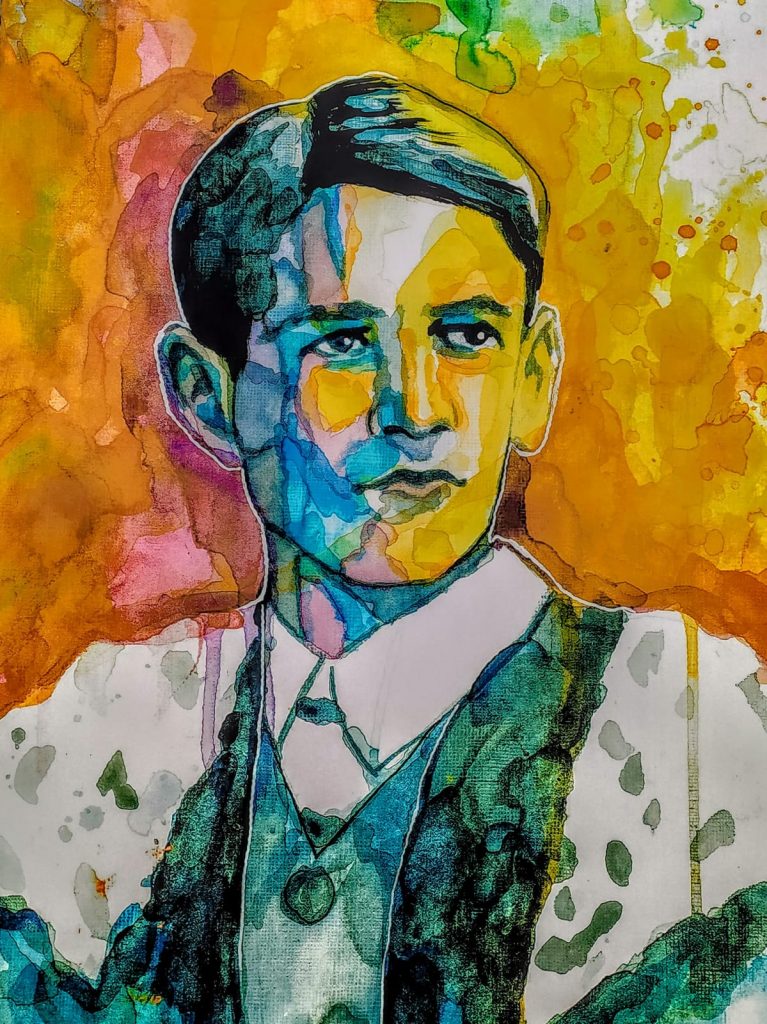IRA Volunteer Terence MacSwiney gave his life for Irish Freedom on October 25 1920, following 74 days on Hungerstrike. Today, 101 years after his death, Anti Imperialist Action Ireland proudly Remember him.
Born 28 March 1879, Terence MacSwiney was one of 8 children living in his home in Cork city and at the age of 6 he was abandoned by his father, leaving him in the care of his mother. Despite these hardships MacSwiney focused on his studies and on helping his family, leaving his secondary school at 15 to work as an accounting clerk. However he continued studying and managed to be accepted into the Royal University of Ireland in cork where he would later graduate successfully with a degree in Mental and Moral science in 1907 at the age of 28.
He wrote constantly, writing a number of plays alongside pieces on Irish history and helped in the founding of the Cork Dramatic Society. A strong republican, he also wrote for the IRB’s newspaper Irish Freedom which helped bring him to the attention of the IRB and its leadership. He would later become president of the Cork branch of Sinn Fein and helped found the Cork branch of the Irish Volunteers in 1913.
He was to be second in command for the Easter Rising in Cork but stood down as was ordered by the countermanding order and would later be arrested by the British where he was imprisoned in Bromyard internment camp in England until July of 1917. While living in Bromyard during his exile he would end up marrying his wife Mauriel Murphy, despite her parents’ objections. The couple would not see eachother much due to continuous arrests of MacSwiney during his actions against Britain. When arrested in 1917 in Cork he would be inspired by Tomás Ashe, the first Irish Hunger Striker to die, and would begin his own short hunger strike before being released.
During the 1918 General Election he was elected as the Sinn Fein representative for Mid Cork and would of course take his seat in the First Dáil. After the murder of fellow republican and friend Tómas Mac Curtain by RIC members, he replaced him as Lord Mayor of Cork. However only 5 months later on the 12th of August 1920 he was arrested for the last time on charges of Sedition and was tried by a British military court. In protest of this unjust arrest and trial he and eleven other Irish Republican prisoners began a hunger strike. The British government refused to yield believing it would cause a loss of loyalty among members of the occupying forces in Cork.
While on his hunger strike Terence MacSwiney gained international attention with protests being launched in France, Germany and America against his wrongful imprisonment. Many attempts were made to break his hunger strike, with food often being placed near him. However MacSwiney refused to give in and continued his Hunger Strike stating “I am confident that my death will do more to smash the British Empire than my release.”
Even as his body withered and died slowly over the course of his 74 day hunger strike he continued on, knowing he would die but understanding it was his duty as a soldier fighting for the freedom of Ireland to be willing to lay his life on the lie for Ireland, he said “I die as a Soldier of the Irish Republic” Sadly the British Government did not give in to his demands and on the 25th of October 1920, MacSwiney died. Over 30,000 people came to see his body lay at St George’s Cathedral in London and equally large crowds gathered in Cork to see his funeral.
Despite his death, he would live on as a revolutionary figure, inspiring all those fighting for their freedom across the world. Socialist Revolutionary Bhagat Singh would quote MacSwiney directly, stating “I am confident that my death will do more to smash the British Empire than my release” to his father before his execution for the assasination of an occupying British officer. Nguyen Ai Quoc, who would later adopt the name Ho Chi Minh, broke down in tears when he heard the news while he worked in London, later saying “A nation that has such citizens will never surrender” and inspired by his commitment, would bring that same revolutionary fervour and commitment to Vietnam, leading it to independence from French Occupation.
Terence MacSwiney was a committed husband,writer and soldier of the Irish Republic. His struggle was heard around the world and his death would shine bright as a star over the whole world, inspiring all those who seeked to free themselves and their countrymen from tyranny and exploitation and he understood this, on his 39th day of hunger strike writing to Cathal Brugha “If I die I know the fruit will exceed the cost a thousand fold. The thought of it makes me happy. I thank God for it. Ah, Cathal, the pain of Easter week is properly dead at last.” From his death a thousand revolutionary lilies bloomed and continue to bloom today, Irish people today carry on his struggle for Irish Freedom, hoping to build a republic of which he could feel happy to die for.
Rest In Peace Terence MacSwiney
Beir Bua agus Tiocfaidh Ár Lá!

